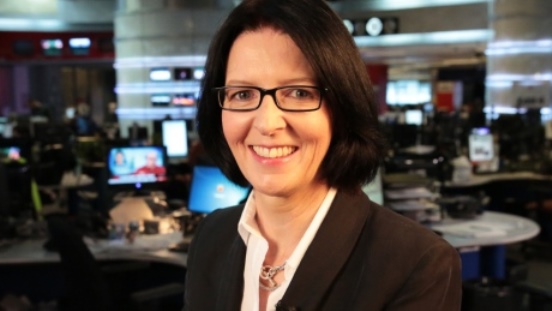
JOIN BILL ROBERTS (former president and CEO of VisionTV) in an exclusive Cartt.ca podcast with Conway as she talks about CBC host firings, the effect of the CRTC’s Let's Talk TV policies, staff cuts, the future of streaming content, CBC Radio 2, ad sales, NHL hockey and more. To get right to the 32-minute interview done at the CBC headquarters, click here.
(Ed note: As a busy executive, Conway doesn’t have a ton of free time for media, so our preamble you’ll read below is taken from a post-podcast interview Roberts did with her to finish up the line of questions he had, but ran out of time to ask – so you can either read it before, or after, listening to the podcast.)
Heather Conway (pictured) walks a fine line in reconciling the aspirational needs of a creative and innovative CBC with the requirement to be both popular and accessible to the Canadian public. "There are quite a few guideposts,” according to Conway. "For example, legislation gives us a mandate to enlighten… but we have to be very cognizant about connecting with audiences too", she said in an interview. And this means "we're not going to reach the broadest audience at all times, but we are going to be relevant."
In Conway's view, the CBC is "not beholden to ratings and shouldn't be… But we need to – as a public service broadcaster – find that sweet spot between relevant and engaging." In her estimation, the new, high-profile CBC six-part series Keeping Canada Alive is "just what we should be expecting of the CBC", says Conway.
Shot over one 24 hour period, Conway is busting with pride that, "it's all about the critical health of our health care system – and it's gripping entertainment as well". And in Conway's opinion, "it's television that no Canadian private broadcaster would do.” In fact, "everyone knows that when there's a news or public affairs crisis, the CBC is where people go,” she says.
That's pleasantly and confidently assertive for a pubcaster Big Cheese.
In the non-factual sphere, Conway holds out Schitt's Creek, coming into its second season, as "the kind of satireabout ourselves as Canadians that the CBC needs to do — it's not just about programming or simulcasting some American comedy — it's actually about us!” she claims.
But how does Conway render these strategic and vital programming decisions? Focus groups? Gut feeling? A brisk brunch with Hubert? Nope. "I sit down with Sally (Catto) our GM for programming, and we hammer out, create, a vision together – then I tell Sally to 'go get it'… you know, you hire talent and taste,” she says.
And then a little managerial insight pops out: "There's a great myth about managing the creative process and creative people. Lots of people say they can manage 'winners' – but it's not true. I don't believe that. The best one can do is get the circumstances right, and make certain that what you create is true to the programming ‘invitation’ – you've got to get that content invitation right."
"You can argue that women have better collaborative skills and aren't so focused on hierarchy… there's greater emotional intelligence at play… and those are the kind of broadcasting skills needed today.” – Heather Conway, CBC
Having articulated her perceived difference between private and public broadcasting priorities, Conway makes it clear that she has no intention of simply being a lame partner or follower of the privateers. "We, as the CBC, must be a leader when it comes to Canadian creativity and factual content,” she says. “Sure we will have small, maybe ongoing, partnerships in the future with folks like Rogers, like Mr. D… but what I'm looking forward to more are partnerships with entities like APTN, and what we can do together in a documentary series on missing and murdered aboriginal women.”
The CBC also recently had its annual employee engagement survey this Spring/Summer, entitled Dialogue 2015, and by mid-June only about 17% of the entire CBC workforce had even bothered to respond. So what gives with Mother Corp's morale? Why such a low response rate when you're so pumped about all this CBC good stuff?
Conway's pulse rate remained steadfast. "Look, we did a shorter survey this year and the focus was more on the (Janice) Rubin report and Ghomeshi's behaviour; and those survey results, by the way, will be made public to all our employees soon,” she adds.
"But we've moved that response rate up to more like 50% now in English Services… and a lower percentage is no big deal when we have more and more employees without desks – online surveys for technicians and videographers aren't the best. People need desks and desktop computers to respond to most surveys,” says the EVP. How about at the AGO when you were a head honcho there? How did those employee surveys go? "Ok they had a higher response rate, but some were as low as 60%,” she says.
And then another managerial nugget. Given that so many women are now in executive positions within Canadian media (TVO’s Lisa De Wilde, Shaw’s Barb Williams, Télé-Québec’s Michèle Fortin, Rogers Media’s Colette Watson, Bell Media’s Mary Ann Turcke) what happy trend are we seeing?
From Conway's perspective, "You can argue that women have better collaborative skills and aren't so focused on hierarchy… there's greater emotional intelligence at play… and those are the kind of broadcasting skills needed today. Media's need for incredible adaptability is more than any economic sector in the world today! Who would have thought about Amazon Studios winning an Emmy award (for Tumble Leaf)? Or a Golden Globe (forTransparent)?, asserts Conway. In her view from the top, "There's a "staggering amount of change happening in broadcasting and women are adept at quickly adapting and being agile.”
For more on Heather Conway's views and style, listen in on our half hour with her by clicking here.


